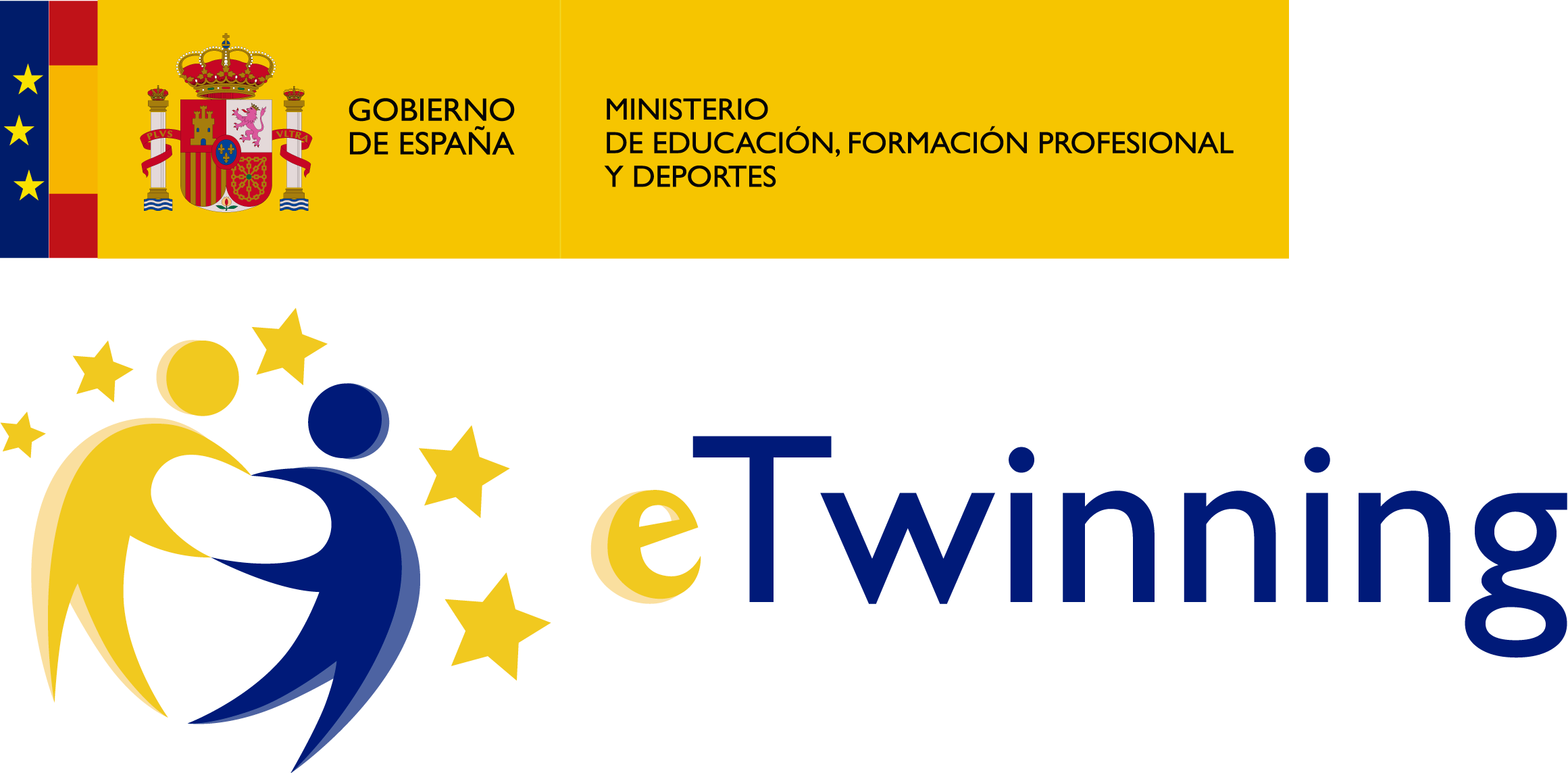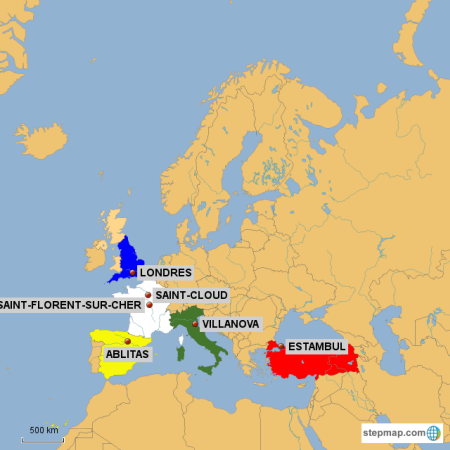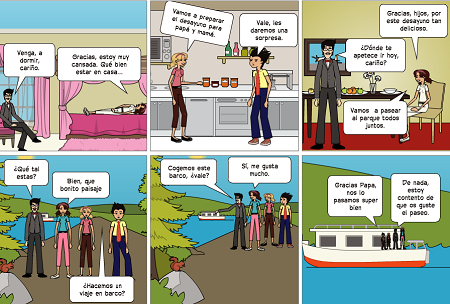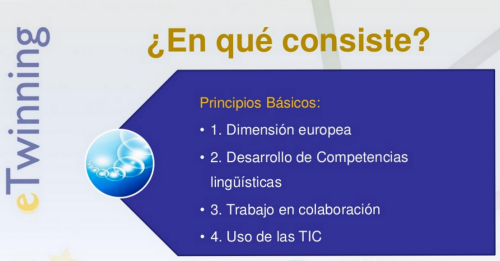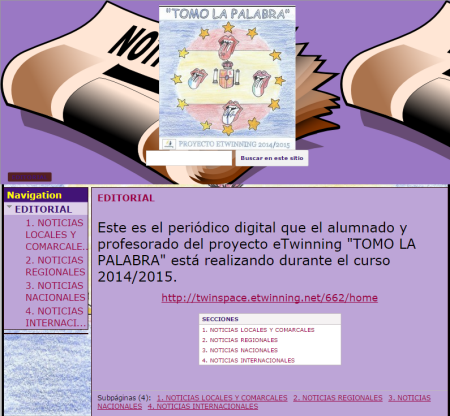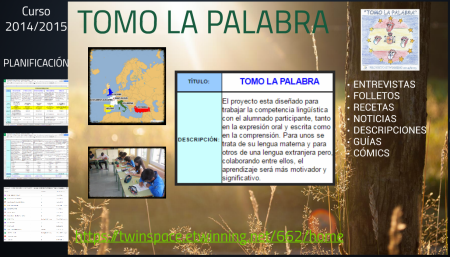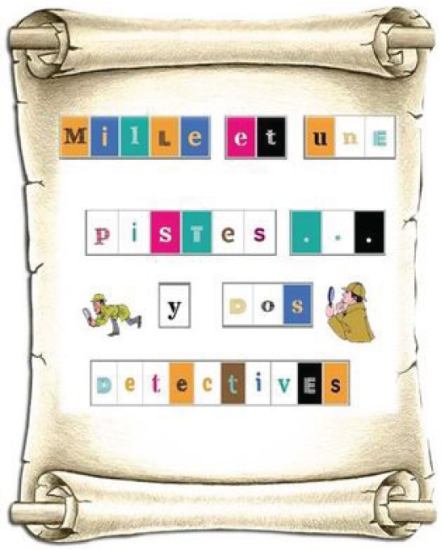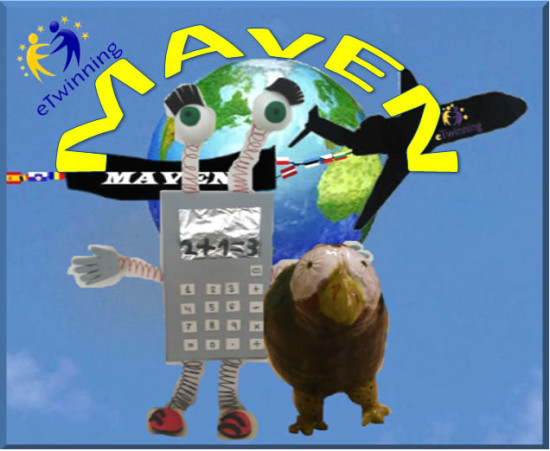I take the floor
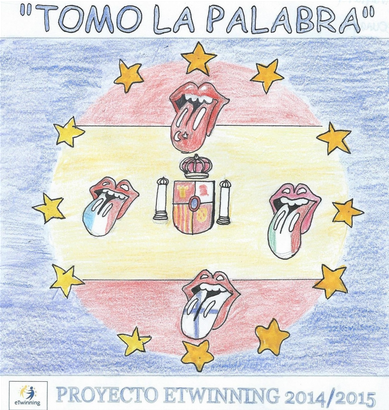
‘I take the floor’ is an eTwinning project between schools in France, Italy, England, Turkey and Spain. It is mainly focussed on the language proficiency of participating pupils, using Spanish as the working language. The activities carried out in collaboration with partner schools show more than satisfactory results that have increased pupil motivation, encouraged work on key competencies and teamwork in international groups. In addition we should underline the good diffusion of the project through the school website and through social networks like Facebook and Twitter. The teacher Juan Fco. Peñas Viso, coordinator at the school of CPEIP San Babil (Navarra) describes the experience and how important it is to build a team and make use of eTwinning projects.
The project was designed to work on language proficiency with participating pupils, both in understanding and in oral and written expression. We used Spanish as the working language in the project. For some it was their mother tongue and for others a foreign language. Pupils and teachers from France, Italy, England, Turkey and Spain participated. Working all together, the teaching-learning process proved more motivating and meaningful.
The goals initially pursued were achieved throughout the project:
- “Communicating with students from other countries and taking an interest in their tastes and lifestyles to enhance the European dimension“. We did this mainly through videoconferences and use of the TwinSpace forum.
- “Expressing themselves adequately, both orally and in writing, taking into account the features of the different communication situations“. We did the work with different types of text that were presented in different written productions.
- “Using information and communications technology (ICT) and different web 2.0 tools in order to obtain information and present the different productions.” We used various ICT and Web 2.0 tools to perform activities collaboratively between groups of mixed nationalities.
- “Working collaboratively with classmates and with the associated schools”. Class pupils didn’t only conduct group work, they also conducted collaborative activities with other classmates from partner schools.
- “Improving language skills in pupils through project activities“. Each pupil improved their language skills through the proposed activities, both written and oral, learning to express themselves through different types of texts studied.
The fact that the pupils were from five different countries and different educational stages was no problem. On the contrary, it allowed further enrichment with contributions in the various project activities. In Spain, pupils from the CPEIP “San Babil” (primary school) in Ablitas were in third stage of Primary Education (10-12 years), while in France (Voltaire College of Saint-Florent-sur-Cher and Gounod College of Saint Cloud), Italy (IC Borgoricco) and Turkey (Istanbul Isik okullari) they were Secondary School pupils (12-14 years). The English ones (Midfield Primary School in Orpington Kent) were primary education pupils and, although they joined late, they did participate successfully in some of the project activities.
Videoconferences were conducted among pupils, while other colleagues used chats and Twinspace forums. We would have liked more interaction among them, but the different school hours and calendars didn’t allow for any more opportunities.
The participation of all project partners was excellent, from the planning and coordination among teachers through videoconferencing, to the implementation of activities by pupils. The different phases of the project allowed individual work in small class groups and groups of mixed nationalities. As a result of the project we can see the different language productions carried out, the appropriate use of ICT and web 2.0 tools to carry out the activities, project-based learning (PBL) and greater awareness of the European dimension by having colleagues from other European countries. In this way, the project satisfied the four basic principles of the eTwinning programme.
At my school there was internal coordination between tutors in the Third Stage of Primary Education to integrate the project into our schedules in the Spanish Language area. So we formed an eTwinning teaching team that allowed the participation of all pupils in the stage and which proved very satisfactory.
The greatest benefit was the motivation of pupils with the participation in an eTwinning project. As teachers, it allowed us to improve methodological strategies by taking into account the contributions of our partners, and it made us be more creative by proposing tasks for pupils with different ages and language skills. For pupils, carrying out a project with colleagues from other countries provided them with the concept of European citizenship and made them see things from other perspectives, sharing spaces and collaborating in final productions.
https://twinspace.etwinning.net/662/home
Materials developed during the project can serve as examples of the different types of texts studied and that are within the curriculum of the Language area. Creative use of the different web 2.0 tools to conduct collaborative activities among pupils can offer teachers ideas of how to carry out their eTwinning projects. Similarly, organization of the Twinspace as a preferred place for dissemination of the work done can help to structure and give greater use in other projects.
Although on other occasions the National Award is only given to the project coordinator, on this occasion two teachers were lucky enough to win, Pedro Pablo Lucena Redondo and Juan F. Peñas Viso. For the former it meant his first prize at national level and it was a great joy for him to see his work in the background recognized. For myself, after having already received several awards, it’s still a great encouragement to continue planning and offering such motivating projects and, like this one, so well received, even though there are more and more quality projects in eTwinning, something which makes us feel even prouder of the work done. We’d both like to dedicate this award to our partner Mª Jesús Escribano Ayensa, who also participated with her pupils in the project and is currently off work. ‘Congratulations and good luck!!!
I’ve always thought that a high degree of the success in an eTwinning project lies with the partners involved. That’s why I asked my dear, admired colleagues to “Take the floor” and write down their impressions. ‘What a Great Team!!!.
- Isabelle Gry (Voltaire de Saint Florent Sur Cher School in France):
“Thrilled to” take the floor “to talk about our project that was, both for me and my students, a very rewarding adventure. I TAKE THE FLOOR wasn’t my first project, but it was my first experience with various partners and with much bigger student groups with different language levels and ages. At first I had my doubts, but I trusted Juan and his extensive experience and great enthusiasm. I learned a great deal with him about planning and collaboration, but also about organization of the TwinSpace and use of tools and I really appreciate it.
From the point of view of the pupils, the project also meant numerous benefits. First of all, it opened my classroom up to Europe: pupils realized in the first year of learning Spanish that language is primarily a means of communication between people and that language, distance and culture are not a barrier to make friends from other countries and learn new things together.
A number of very attractive and stimulating activities were also proposed in the project with a great variety of ICT tools that encouraged the active participation of pupils and their creativity. They thus became cartoonists, journalists, cooks, tour guides … a fun way to improve and expand communication in the foreign language with their European colleagues.
They not only used ICT and learned the contents of the subject, but they also developed a number of very important transferable skills for their future. With mixed nationality groups they learned to work together on all tasks, to see the importance and the role that each plays in the project, to be tolerant of diverse ideas and opinions that everyone can contribute.
The project results have been very positive, and cannot only be seen in self-assessment and assessment of the project by pupils. They could be observed in class when they looked happy, enthusiastic and motivated performing activities, satisfied with the work done, when they were the ones who asked at the end of course if they were going to do another project, or when they overcame the difficulty of speaking in public to present the project to their classmates and families.
What I also appreciate a lot in the project is the communication with partners, which has been excellent, we’ve helped each other and we shared ideas. More than partners we’re a team, a team of friends who still work together, enjoying the wonderful methodology that eTwinning provides. Thanks colleague, thanks eTwinning!!”
- Vanessa Gisbert (Gounod College from Saint Cloud in France):
“I’m taking the floor to thank my partners and especially Juan and Pedro who first welcomed me in this project. My pupils and I learned loads with them. This project was an extraordinary adventure. In the first place for the pupils the benefits were of course numerous from a linguistic and cultural point of view, but also from a human point of view.
Thanks to eTwinning, Europe was more than speaking, pupils were able to experience what European citizenship was. With collaborative tasks and cultural exchanges in various activities, they realized that young people in different countries had a lot in common, but also with other tasks like holidays, for example, they learned about customs they had no idea about. It was a great cultural awakening.
Pupils often think that what they study is far removed from their everyday lives, and a little boring. But with the project “I take the floor” they found that the language they were learning allowed this communication, but that they also needed transferable skills to carry out the activities. ‘Super chef’ was a great moment for them, for example, when they had to follow a recipe from another country at home, and it wasn’t only the pupils that enjoyed this task, but their families too. As shown in the assessment, they loved the adventure, the exchange with so many countries, the use of ICT, the collaborative work between countries, but it also created great solidarity between pupils in the class.
It was also an unforgettable experience for me. And now I’m going to talk about my partners, since without them the project obviously wouldn’t have existed. They’re very generous, especially Juan and Pedro and they have a lot of patience. ‘Super Juan’ as Sara calls him answered at any time when one of us had a technical problem. He knows a load of tools, and he’s always looking for new ones and has some great ideas. We’re more than partners, we’re a team, we care about each other, when someone has a problem the others try to help. To communicate, we used videoconferencing, emails, WhatsApp, some Twitter.
I think what unites us is the idea that education must evolve, knowledge doesn’t have to stay in the classroom, new technologies allow us to revolutionize our methods, and to offer our pupils a broader view of the world and knowledge. But neither would have been possible without the eTwinning programme, the fact that it’s an official European institution helps us a lot and offers parents security with Twinspace, The seals and awards motivate the pupils a lot.
I’d like to finish by thanking my pupils for their enthusiasm and their excellent work in this Project”.
- Sara Terrassan (IC di Borgoricco, Italy):
“I’d also like to take the floor to thank my colleagues for the great work and, of course, to thank my pupils who participated with such fervour. The project was initially designed to make it possible to work with content and language skills normally covered in an A1/A2 level ELE class, so it was very easy to get my pupils hooked and to organize the work. Spanish is the second foreign language they study and they only started two years ago with two weekly classes. They were able to use Spanish to express themselves with European colleagues and this motivated them to learn. They were also able to say something about their reality with traditional recipes and local news, and sometimes they learned something new about their region to be able to tell their project colleagues. This for me was the most successful part: pupils wanted to learn to communicate.
The constant support among teachers, especially our ‘super Juan’ and the pupils’ enthusiasm to study by enjoying themselves was the big difference about this project compared to others that I’ve completed over the past few years.
Pedro and Juan, Thank you for sharing your well-deserved award!”
- Beril Tapkan (Isik Okullari, Istambul, Turkey):
“Participating in the “I take the floor” project ‘was a pleasure, not only for me but also for my pupils. I must emphasize that we learned a lot. ‘I take the floor’ was the second project I’ve done in eTwinning, but it was a totally different experience. I had doubts about the project’s connection with my curriculum. With the support of my eTwinning colleagues I did it quickly and easily. With the project I had the chance to teach my pupils that there’s a world outside the school where people speak Spanish at different levels. They gained fluency and were motivated with the preparation of videos, tour guides, etc.
My students only had knowledge of Spanish as a foreign language that they acquired during their first year of learning. Despite this, they strove to meet their partners from Spain, France, Italy and England.
Using ICT in my classroom was a good opportunity to improve my knowledge and it became a more enriching experience than a seminar.
For me the project was about the great teamwork. During the project I felt like my colleagues and I were working at the same school but in different campuses. ‘I take the floor’ brought together continents and ideas.
Thank you to all my partners! Thank you to ‘I take the floor!’.
- Miguel Santillán (Midfield Primary School de Orpington Kent, England):
- Pedro Pablo Lucena Redondo (CPEIP San Babil de Ablitas – Navarra, Spain):
“Working in these types of collaborative projects is not only effective in improving the use of different languages we use in our European environment, but it also allows us to insert the use of information and communications technology (ICT) in the classroom and, therefore, in the curriculum,.
These types of multidisciplinary projects make it possible to combine different contents from different subjects/areas, in addition to collaboration with other children, thus being a more meaningful and enriching learning process. This way of working with pupils, even more so if you do it in their native language, makes them the main characters of their learning and the “teachers” of their own classmates and especially other European partners. So I think it’s a great way to learn, know and become aware of our presence and belonging to Europe, as well as publicizing our language to others and learning to appreciate it more, if possible”.
[youtube]https://youtu.be/Lt04oxI7GIc[/youtube]
Video made by partners from other countries to congratulate us on the award.
Thank you very much to all those who participated in this project, teachers and students, and to all those who have supported and encouraged us from outside, advisors, families, ambassadors and eTwinners in general us. Long live eTwinning!!!
eTwinning Awards 2015
